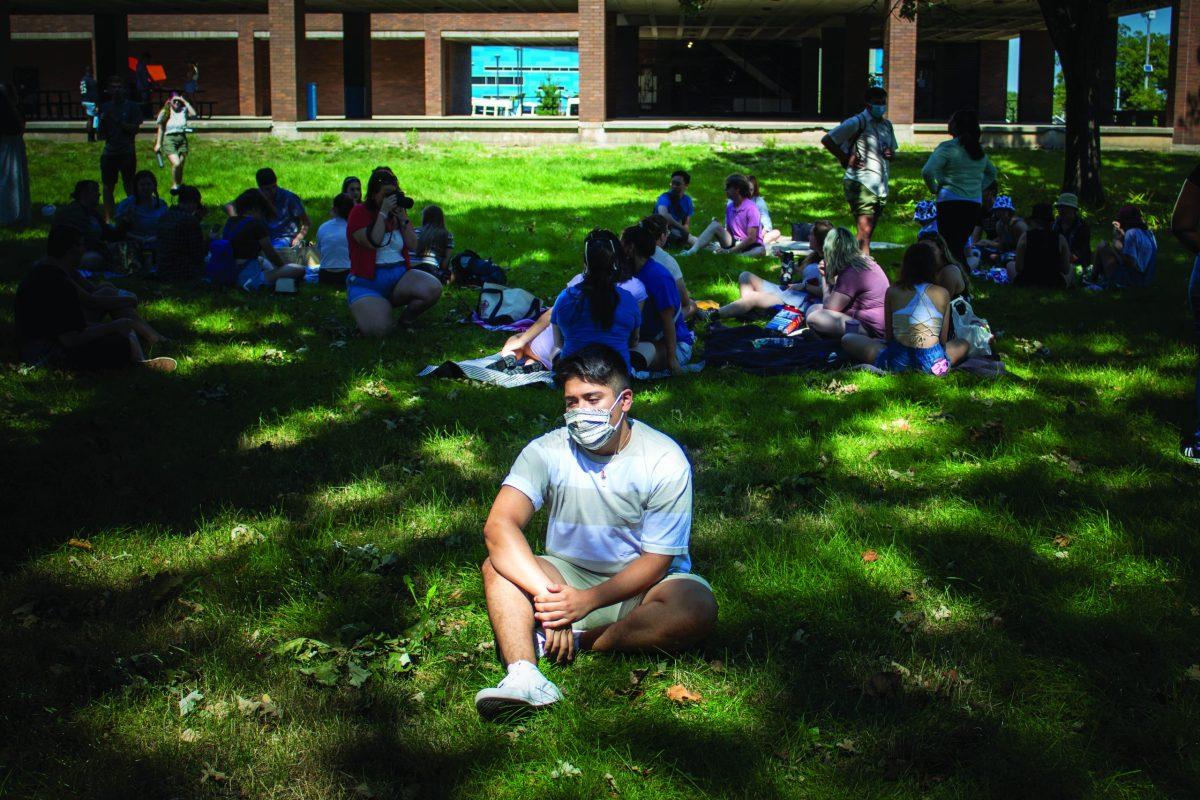On Aug. 4, Drake University received a forecast of how COVID-19 would spread on campus over the following four months. Epistemix, a company that produces models for the spread of infectious diseases, provided Drake with a report that helped the university decide which COVID-19 protocols it should implement to slow the spread of the virus.
The projection was based on multiple factors, such as Drake’s mask mandate, the vaccination rate for the student population and the conditions of the surrounding community, according to Drake chief of staff Nate Reagen. Reagan said the model included a very wide range for case numbers but so far, Drake has maintained low positivity rates and is at the lower end of the range that was given by Epistemix.
“Given our vaccination levels and mask policy, Epistemix is forecasting a moderate peak for Drake in mid-September,” Reagen said, although he added that the purpose of the report is “more about trying to inform decision making than it is about being a predictor of the future.”
According to its website, Epistemix was founded in 2017 by three men who wanted to build a business that helped large corporations and lawmakers make decisions regarding the spread of diseases. Originally, the founders created simulations for the spread of HIV and AIDS, but the company expanded to create simulations for COVID-19 cases. Reagan said Drake’s COVID-19 protocols are also informed by the CDC and “very frequent” meetings with the Polk County Health Department.
“Based on [Epistemix’s] analysis, it definitely informed our decision to keep with our mask policy but remove our social distancing restrictions we had in the spring,” Reagen said, adding that the report from Epistemix stated that social distancing had “no material impact” on case numbers.
Although Reagan said the COVID-19 spread simulation provided a forecast for the next four months, he also said the university won’t be relying on the report in the future or releasing it to the public. He added that Drake is looking at options to reduce the cost of ordering another report from Epistemix.
“[The report is] informed by data and science, but now that it’s a month old, we’re not planning to leverage that,” Reagan said. “The only thing it helps us know is that 80% vaccination [of the student body] is a good number.”
If the student vaccination rate reaches at least 80% by September 24, Drake has said it plans to give out 20 one-time scholarships of $2,500 to vaccinated students.
Another change from last year is that Drake no longer requires surveillance testing for COVID-19. During the last academic year, students were periodically required to be tested for the virus.
“We tried everything to encourage participation: student senate outreach, prizes, incentives, text messaging, [et cetera]— with very little student participation,” Reagen said.
Drake President Marty Martin wrote in a campus-wide email on March 15 that the low participation in testing reduced Drake’s ability to monitor cases.
“A lack of participation undermines the validity of the surveillance testing results, which raises the risk that the virus will spread undetected across our community,” Martin said.
This year, free COVID-19 tests are available at the Student Health Center for students exhibiting symptoms, and Reagan said these tests are sent to the Broadlawns Medical Center lab located in Des Moines for evaluation. Reagan said this new partnership began on Aug. 30. Before then, COVID-19 samples were tested by Corteva Agriscience, which has since stopped evaluating COVID-19 tests.
Because of the very low rates of positive tests last spring and Drake’s “relatively high” vaccination rate, Reagan said, the university made the decision not to require surveillance testing at this time. Students who are not experiencing COVID-19 symptoms but wish to get tested need to go to an off-campus location such as Hy-Vee or Walgreens or contact their personal healthcare provider. According to Drake’s Sept. 10 COVID-19 update, 75% of students taking at least one in-person class were vaccinated.
Research conducted by the CDC and many other organizations has shown that the COVID-19 vaccines authorized in the U.S. are effective in preventing infection and even more effective in reducing the severity of infection. White House coronavirus response coordinator Jeffrey Zients said in a press briefing that a new CDC study of 600,000 COVID-19 cases shows that unvaccinated individuals are 11 times more likely to die from the virus and 10 times more likely to be hospitalized.
Drake has averaged three to four confirmed cases of COVID-19 over the last three weeks, according to the university’s COVID-19 updates, although cases and hospitalizations are surging in Polk County.
“Drake students [need] to remain diligent about wearing masks, watching for symptoms, and getting vaccinated if they have not already,” Reagen said. “We cannot stress enough that every Drake community member that gets vaccinated helps adjust that projection downward by protecting themselves and everyone around them.”







